I am a monster you don't have to imagine.
I don't generally make it my business to engage with men on feminist issues. It's not my responsibility to teach every college male - if he wants me to tutor him in human decency he can hit up my paypal (kresh426@mit.edu) as easily as he pays MITPAY. In this post, I refer and respond to several sources mainly because I felt that
Laurie Penny's response while well written, constructive, and engaging was not where I wanted to leave the discussion.
But I'm getting real tired of these whining young men in STEM fields. Of the grown male authors who refer to nerdy women and girls as an underutilized resource. Of the entitled men who frighten children with pornography of fictional ponies. All of their anger seems to be based on the fact they didn't 'get some' in high school and/or college. To quote a fictional lesbian:
Jenny: Oh, fuck off, Mark. It's not my job to make you a better man and I don't give a shit if I've made you a better man. It's not a fucking woman's job to be consumed and invaded and spat out so that some fucking man can evolve. (The L Word)
Becoming us, dating us, consuming us is not the answer to your problems. We are our own unconquerable people.Yet another STEM man has decided to rationalize his support of
a known sexual abuser by describing the bullying he experienced as a white heterosexual male nerd.
My recurring fantasy, through this period, was to have been born a woman, or a gay man, or best of all, completely asexual, so that I could simply devote my life to math, like my hero Paul Erdös did. (comment 171)
I’ve always felt a special kinship with gays and lesbians, precisely because the sense of having to hide from the world, of being hissed at for a sexual makeup that you never chose, is one that I can relate to on a visceral level. (another of his post)
First off: How entitled to you have to be to want to steal my skin, my identity, my sexuality for yourself? You do not have any kinship with me or the LGB people. You have married your wife! It is legal for you to marry your wife! You will not be fired from your job because you are married to your wife or express your heterosexuality! If I wish to enter an
Boston marriage with a woman, I will have to very carefully choose where I live and work. I would have only been able to do so since
Oct 16, 2014 in my home state of Virginia with 43% of polled people being opposed to this ability.
There is no federal protection against firing LGB people.
You have literally no visceral kinship with us; you are not us. You don't get to feel a kinship our blood and sweat, our bodies beaten or dead. Nor do you express "kinship" with lesbian women by linking to an article that addresses sexist work place discrimination by countering with the ability of
heterosexual women to get responses from
men on a dating website. How do you manage to call lesbians your kin and also erase lesbians? STOP. Stop stealing us, consuming our pain from your very very safe place as a grown up.
Secondly: I live at the intersection of your fantasies: I was and am a woman, asexual. I was a geek.
In middle and high school I was ruthlessly teased for those precise reasons. For so very many things more.
For being mulatto - for my wide nose, my frizzy curly hair, my just-too-southern-black accent. For being short. For my asthma. For wearing glasses. For being too bookish. For getting good grades. For being quiet.
I was always the Before of the Princess Diaries, simultaneously invisible and subject to ridicule. The very qualities that he imagines as freeing him to devote himself to his academics created a barrier so onerous, socially and academically, I fell behind my academics and became suicidally depressed. To the point I had to go to a therapeutic home with attached school for some time. I don't mean to discount what this man experienced in his boyhood or to compare traumas. What I mean to point out is that
my identity is not a fantasy or an escape. Quite the opposite. Bullying due to my intersectional identity
negatively affected my academic focus and performance.
Inhabiting my positionality is not a release from fear but rather to live in the intersection of different fears. Finally,
his imagining is based on the fact that he refuses actually know us. We do already exist. We do document and discuss our experiences with discrimination and bullying.
We don't have to be imagined by a man. It seems impossible to me that a grown educated man be unaware that there are
black women who like science. Or non-het women who like comics,
lesbians as the heroines of comics. He chooses not know our lived experiences with layered discrimination. He refers to his (mis)reading of white radfem texts to establish his authority and validate his refusal to listen to other voices, including women of color and lesbian women.
Here is another radical feminist and a woman of color: bell hooks
They are quick to tell me I am different, not like the "real" feminists who hate men, who are angry. I assure them I am as real and as radical a feminist as one can be, and if they dare to come any closer to feminism they will see it is not how they have imagined it. (via bell hooks, feminism is for everybody)
She describes his familiar tacts of purposeful misidentification or refusal of identity.
To continue to imagine us, he must refuse to respect our reality, our history. She recognizes that these are techniques of dismissal.Much as I try to understand other people’s perspectives, the first reference to my 'male privilege' — my privilege! — is approximately where I get off the train, because it’s so alien to my actual lived experience (comment 171 via article)
These are the perspectives of my geeky friends, my intimate experiences, my academic training.
I knew all the other "imaginary" nerds: the gay geeks, the black nerds, the poor nerds, the young girl geeks. I knew the girl who relied on the public library for her books and generously loaned those books to kids who couldn't get to the library. I knew the girls who longed to be noticed, appreciated, by those nerdy boys who mocked us, tested our knowledge, discounted our thoughts. I knew too the boys who wanted to be known by other boys, who wrongly thought those white het male geeks would be a little less racist, a little less homophobic, a little less classist. I knew the heated discussion of black music between AfroSamurai, Boondocks, and Samurai Champloo. I knew the feminine discounted knowledge: the shojo manga with frilly titles and the Tamora Pierce that wasn't
real fantasy.
Monstrous words, dripping frogs not pearls.
So what terms do we engage with these men on? How do we respond to our dismissal? How do we escape the bullying and discrimination?Even when we try to escape to the intellectual world, we find sex or race or class based discrimination in professional fields. We can never forget or move on from the middle school bullying because we are not part of the STEM communities that validate and empower each other based on that shared experience. Nor do we share 'that' het white male experience of nerdiness bullying. Again, women and minorities face an intersection of different fears.
Unlike Aaronson, I was also female, so when I tried to pull myself out of that hell into a life of the mind, I found sexism standing in my way. I am still punished every day by men who believe that I do not deserve my work as a writer and scholar. Some escape it's turned out to be. (via article)
Even when we describe our perspectives in the "right" ways we are dismissed.
He refuses to confront the truth of what we live whether narrative or rhetorical, quantitative or qualitative. Presumably he doesn't accept the racism and sexism described in AYA; maybe that's not a
real comic book or a
real description of lacking privilege. As he admits, he "read many studies and task force reports about gender bias" so he has been faced with empirical evidence too.
Harassment of any kind is not acceptable behavior at MIT; it is inconsistent with the commitment to excellence that characterizes MIT's activities. [...] The Institute is committed under this policy to stopping harassment and associated retaliatory behavior. All MIT supervisors have a responsibility to act to stop harassment in the areas under their supervision (MIT policy on sexual harassment)
Again this 97% feminist ally is a man who is choosing to support a known abuser, who wants to return a venue to a known sexual abuser despite MIT's clear policy on no tolerance for sexual harassment.
Let's not forget: this whole thing started because he wants to keep up the lectures of a known male sexual abuser. He wants the details of the harassment public, regardless of the victim's needs and wants - even if she's (or any other abused women) embarrassed. To him, the "wrong message about MIT's values" is to enforce the policy of no tolerance for sexual harassment. He refuses to listen to women's experiences or research.
The last 3% are apparently the points that actually matter, convert to action. Penny, you need to address this blatant sexism in your feminist response! Most men are disturbed by hatred and fear of women, by male violence against women, even the men who perpetuate this violence. But they fear letting go of the benefits. They are not certain what will happen to the world they know most intimately if patriarchy changes. So they find it easier to passively support male domination even when they know in their minds and hearts that it is wrong. (bell hooks, feminism is for everybody)
Of course some pissant will come along to tell women speaking of work discrimination that we should be grateful that men might just fuck us:
This comes across so strongly as “my suffering is worse than your suffering” spiel, so much so that I’m tempted to argue it and review a bunch of experiments like how even the least attractive women on dating sites get far more interest than men. Or how women asking random people for sex on the street get accepted more than two-thirds of the time, but men trying the same get zero percent. Or how the same study shows that the women who get declined get declined politely, while the men are treated with disgust and contempt. (via said pissant)
Where is is the 97% of his agreement to call this pissant out? No, he commend and links to them.
It seems to me we are going to be dismissed no matter what, whether we have lived experience, detailed studies, or institutional policy on our side. These male nerds are not going to assist us in ending the bullying, abuse, and discrimination because they insist it never happened even as they platform sexual abusers.
Let's reverse the patriarchal reversal: What are we to ask him?Monsters who tear down houses
There are a lot of young men out there - I suspect even now - who sometimes wish they'd been born when things were a bit easier, when the balance of male versus female sexual shame was tilted more sharply by the formal rituals of patriarchy, when men could just take or be assigned what they wanted, as long as they were also white and straight.
There are a lot of older men out there who long for that real or imagined world more openly, and without any of Aaronson's nuance and compassion. I would challenge men to analyse that longing, to see it for what it is. And then to resist it. You are smarter and better than that. (via article)
What exactly is
nuanced about wanting male power back? What exactly is
compassionate about wanting to revert to assigning women as property, chattel, and objects? What does it say about a person that they are well adapted to the contractual and ritualized exchange of women as property-objects? What does that predict about how they approach their relationships? Why does he resist anti-rape campaigns so adamantly? What about his behavior with women makes him fear accusations of sexual abuse? Why do we as women keep pretending that there are not class interests at stake here?
Whose passion is validated?
Male passion, specifically male violent fantasies. She ignores the real truth in the fantasy, a dangerous violence in male power fantasy. This man isn't stupid. He's knowingly choosing to engage in this fantasy just as he is knowingly recounting it as a ploy for sympathy. He is aware of the power imbalance in his fantasy; that female vulnerability is precisely what's appealing to him. The patriarchy is a power hierarchy designed to be beneficial to men; smart men came up with it to protect their class interests. You can't extend compassion to someone who wants you back in chains.
In case you'd rather deal in fantasy, for a geeky parallel:
Why do men like slave!Leia so much more than any other incarnation of Leia? More than normal!Leia or senator!Leia or warrior!Leia or pilot!Leia? Why do we allow men to sexually fantasize about a strong young woman when she is at her most silent and vulnerable?
What does it say about male nerd culture that men want to 'remember' back to the time when she was in chains and sexually available against her will?Why do we excuse these monstrous fantasies? Why do we validate them? Why don't we admit the truth - these men are the same slime slugs as any male who fantasies about taking away women's rights and self determination. Let's do what Leia did.
- Kill the male fantasy by taking hold of the very chains.
- Reject it outright as wrong and abusive.
- Build our own revolutionary world.
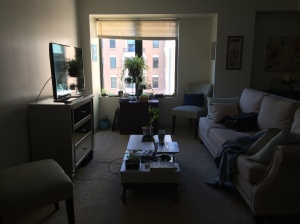 My Messy Apartment[/caption]
My Messy Apartment[/caption]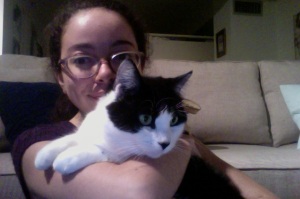

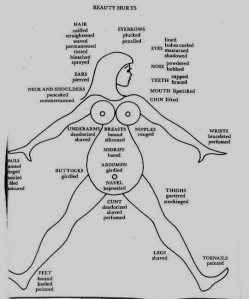
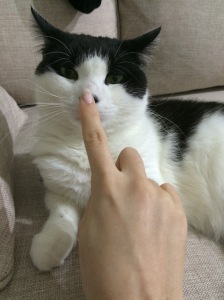
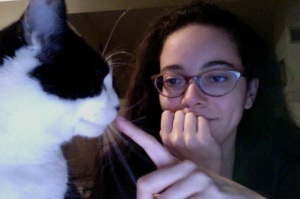
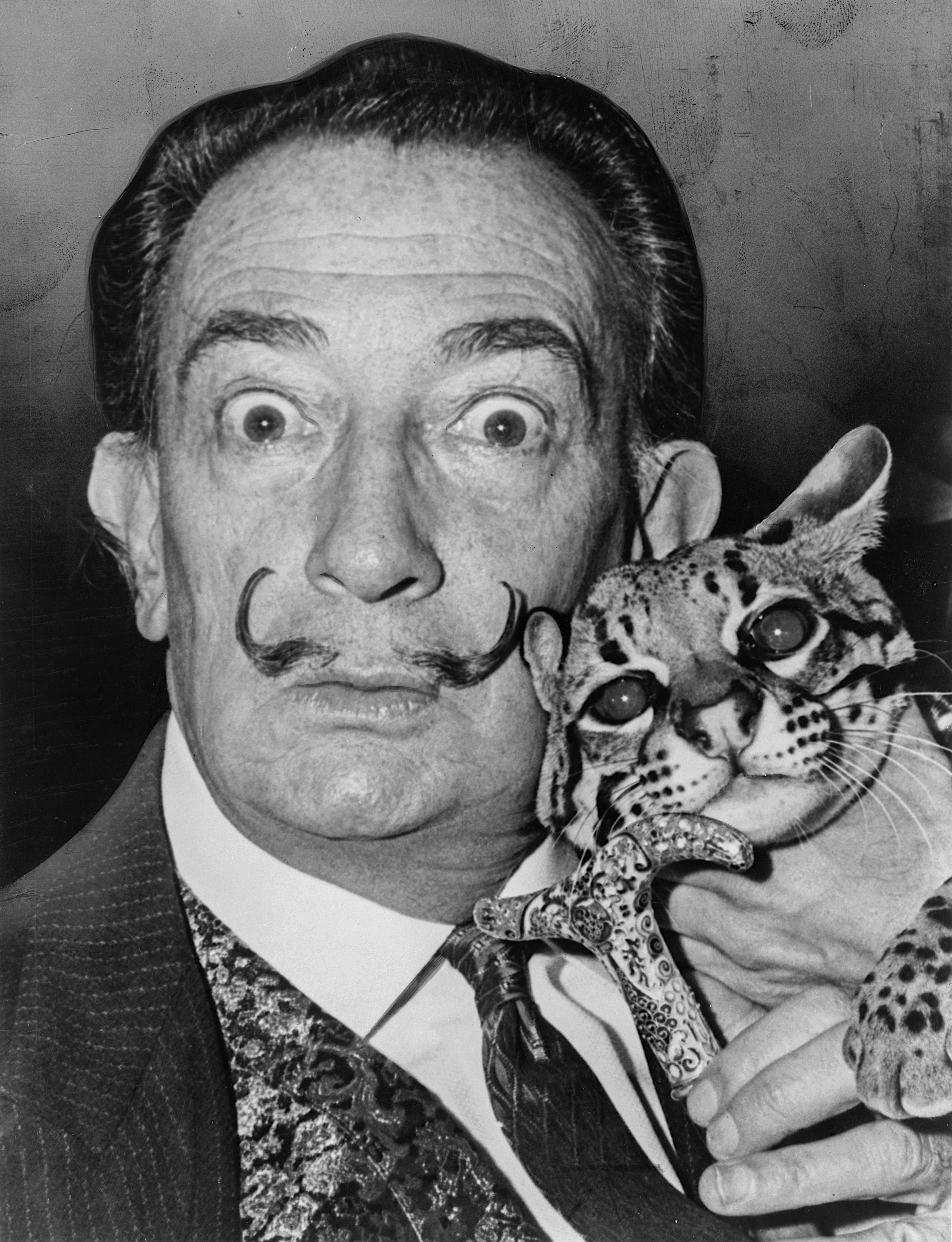 Dali and Babou[/caption]
Dali and Babou[/caption]
